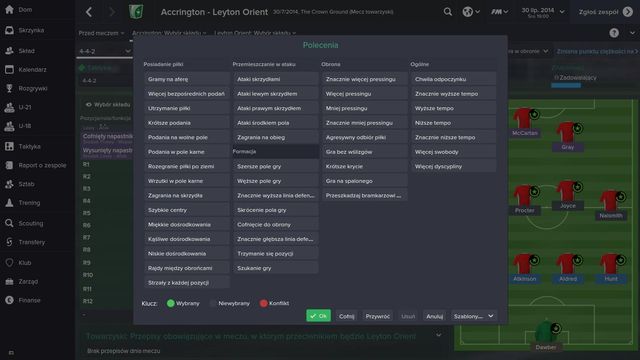Instructions | Match preparations

Instructions allows you to determine the basic tactic elements and how will your players behave in specific situations on the pitch. You can choose as many instructions as you want, but remember that selecting one of them eliminates the one that is contradictory to it. There are five groups of instructions:
Possession
INSTRUCTION | DESCRIPTION |
Go route one | Instructs your players to look to get the ball into the attacking third with increased urgency, playing long balls over the midfield and into dangerous attacking areas quickly. |
More direct passing | Instructs your players to adopt a style of passing based around a quicker transition from back to front, with the ball covering long distances in a shorter amount of time. |
Retain possession | Instructs your players to prioritize keeping hold of the ball. |
Shorter passing | Instructs your players to adopt a style of play based around shorter passing and greater ball retention. |
Pass intro space | Instructs your players to look to make passes into space. |
Work ball into box | Instructs your players to work hard for their opening, remaining patient and not forcing the issue. |
Play out of defence | Encourages defenders to pass their way clear from the back rather than clear the ball long. |
Pump ball into box | Instructs your players to launch high, long-range passes into the opposition's penalty area. |
Clear ball to flanks | Instructs your players to look to make their clearances into wider areas to be picked up by attacking players. |
Hit early crosses | Instructs players to cross the ball early. |
Float crosses | Instructs your players to play high, floating crosses into the penalty area with the intention for the ball to hang in the air and allow a forward to position himself sufficiently to take advantage. |
Whipped crosses | Instructs your players to deliver balls with pace, dip and swerve in order to make it as hard as possible for defenders to deal with them. |
Low crosses | Instructs your players to play quick and powerful crosses into the penalty area with the intention of catching a defender off guard against a quicker forward with good movement. |
Run at defence | Instruct players to run at the opposition more than your tactics allow by default. |
Shoot on sight | Instructs your players to shoot when the opportunity arises instead of waiting for a more clear-cut opening. |
Penetration
INSTRUCTION | DESCRIPTION |
Exploit the flanks | Instructs your players to look to take full advantage of wing play, perhaps due to an opposition weakness. |
Exploit the left flank | Instructs your players to look to take full advantage of the left wing, perhaps due to an opposition weakness. |
Exploit the right flank | Instructs your players to look to take full advantage of the right wing, perhaps due to an opposition weakness. |
Exploit the middle | Instructs your players to look to take full advantage of playing through the middle, perhaps due to an opposition weakness. |
Look for overlap | Instructs your players to hold onto the ball and look for an overlapping player in support, most likely a marauding full-back. |
Shape
INSTRUCTION | DESCRIPTION |
Play wider | Instructs your players to look to stretch the pitch and play wider. |
Play narrower | Instructs your players to look to narrow the field and play in the middle of the pitch. |
Much higher defensive line | Instructs your players to adopt a much higher position on the pitch, closer to the halfway line, in a bid to compress the space in which the opposition can play whilst remaining close to their midfield team-mates. |
Push higher up | Instructs your players to play higher up the pitch, starting with the line the defence holds, which should be close to the halfway line if this option is chosen. |
Drop deeper | Instructs your players to retreat into their own territory and defend it from there. |
Much deeper defensive line | Instructs your players to adopt a much deeper position on the pitch, retreating into a more compact shape closer to their own goal to prevent the opposition from exploiting space in behind them. |
Stick to positions | Instructs players to stick to their primary duties in their assigned position. It does not allow for fluidity of movement. |
Roam from positions | Instructs players to be more creative and fluid with their positional locations on the pitch, demanding sufficient tactical awareness so one player is able to fill in for another who has roamed from his position. |
Defending
INSTRUCTION | DESCRIPTION |
Close down much more | A very strong pressing - it creates windows of opportunity for your rival in other formations. |
Close down more | A strong pressing that starts on the rival half of the pitch. |
Close down less | This setting basically means leaving the fault formations and control of the predefined positions. |
Close down much less | A defense focused on protecting the gate, sometimes it stops attacks on other parts of the pitch. |
Get stuck in | Instructs your players to be aggressive and strong in the tackle. This may increase the risk of fouls and disciplinary action. |
Stay on feet | Instructs your players to stay on their feet when making tackles instead of going to ground. |
Use tighter marking | Instructs players to adopt a tighter marking scheme in defensive situations where players are encouraged to stick particularly close to their assigned opponent in order to prevent them from attacking the ball. |
Use offside trap | Instructs the team to operate with the offside trap. |
Prevent short GP distribution | Instructs your forward players to press the opposition high up the field in order to stop the goalkeeper being able to distribute the ball over shorter distances to defenders and instead take risks or have to resort to a longer delivery. |
General
INSTRUCTION | DESCRIPTION |
Take a breather | Instructs your players to keep hold of the ball and simply take a moment to recover physically before attacking again. |
Much higher tempo | Instructs the team to go about their business in a more urgent fashion, moving the ball around quickly and decisively, using the intensity of their approach to unsettle the opposition and eventually tire them out. |
Higher tempo | Instructs the team to go about their business in an urgent fashion, moving the ball around quickly and decisively, using the intensity of their approach to unsettle the opposition. |
Lower tempo | Instructs the team to go about their business in a considered and patient manner, taking their time with the ball and often retaining possession in order to retain control of the game. |
Much lower tempo | Instructs the team to go about their business in a more considered and patient manner, taking their time with the ball and often retaining possession with no great short-term purpose, with the intention to retain control of the game. |
Be more expressive | Allows more creative players the freedom to play the game with additional creativity and flair outside of the confines of a team's tactical setup. |
Be more disciplined | Asks players to play as part of a robust and focused tactical shape in order to make the team a stronger collective group. It may come at the expense of some individual expression. |
You are not permitted to copy any image, text or info from this page. This site is not associated with and/or endorsed by the SEGA or Sports Interactive. All logos and images are copyrighted by their respective owners.
Copyright © 2000 - 2025 Webedia Polska SA for gamepressure.com, unofficial game guides, walkthroughs, secrets, game tips, maps & strategies for top games.
